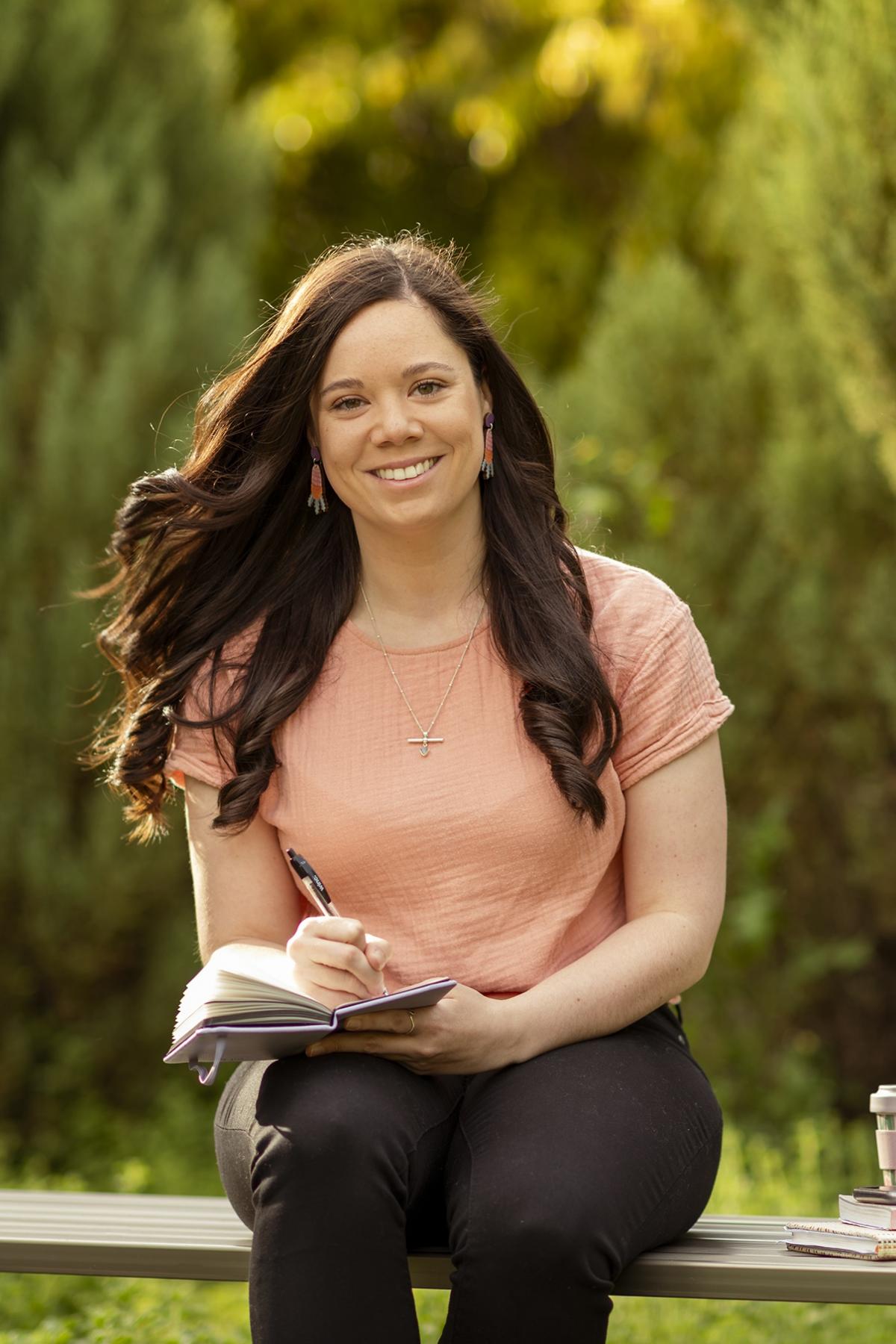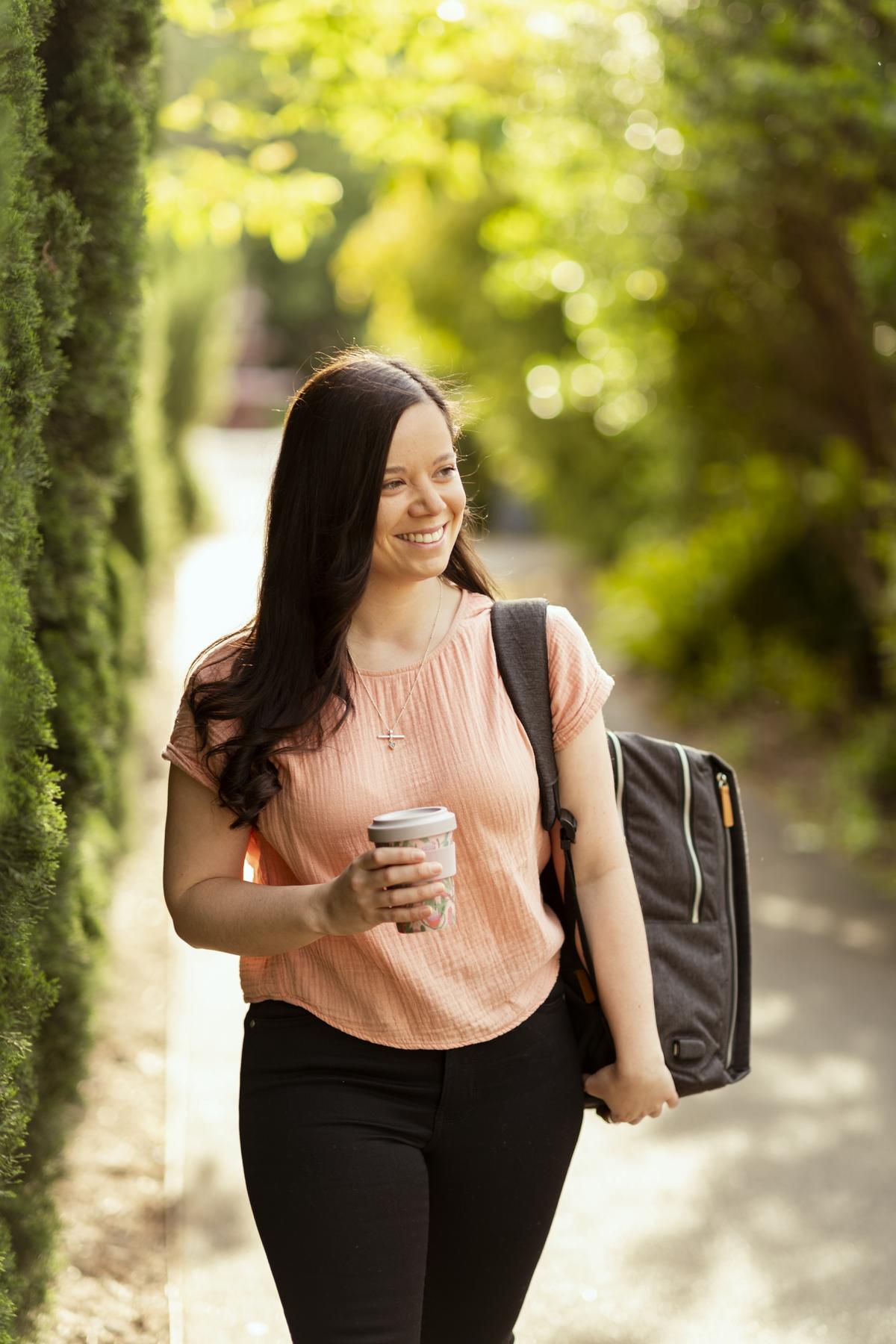Connected Conversations | Tassia Oswald
Tassia Oswald’s strong sense of environmental and social justice stemmed from a young age. After discovering that framing environmental issues in terms of health is a powerful way to influence decision-makers to take action, Tassia undertook cross-disciplinary studies in psychology and public health. Recently taking home both the People’s Choice Award and Student’s Choice Award at the 2021 University of Adelaide 3MT Finals, Tassia hopes her research into psychological impacts of ‘screen time’ and ‘green time’ for children and adolescents can help her secure a place as an international postdoctoral researcher or policy-maker in the future.

Please tell us a little bit about yourself.
Hi! My name is Tassia and I am in the final part of my PhD in the School of Public Health. My research is looking at the psychological impacts of ‘screen time’ and ‘green time’ for children and adolescents. Specifically, I am exploring how the use of screen-based technologies can impact cognitive and mental health outcomes in young people, as well as how nature may act as a buffer, or protect psychological wellbeing, in a high-tech era.
My background is in psychology and epidemiology — a unique combination which has allowed me to build an understanding of the spectrum of possibilities for social and health change, from an individual level, through to the way in which society is organised, with the roles of institutions, policy, and wider environments. I am especially passionate about research in the nexus of human and environmental health, a field which has become increasingly important in the Anthropocene.
I have grown up here in Adelaide and, in my spare time, I enjoy going on hikes, trying out new food places, and hanging out with my cat, Pickles.
What was your first area of study and what drew you to this space?
I actually began my university studies in a double degree of Bachelor of Laws, Bachelor of Environmental Policy and Management. I was drawn to these degrees because I have always been really passionate about caring for the environment and I wanted to have a career which could make a difference in this space. I thought that this would be the way to go about it, but soon realised that it wasn’t quite right for me!
What has been your journey to get where you are today?
I have certainly made many deviations to get to where I am today! After I realised that law and environmental management wasn’t right for me, I took some time off to travel and explore different options. I still wanted to make a difference in the environmental space, but I didn’t know how I could best do this.
I began to realise that framing environmental issues in terms of how they can impact human health is one of the most powerful ways to persuade politicians and decision-makers to take action on environmental issues. So, I chose to pursue a psychology degree with a double major in epidemiology, which allowed me to experience a range of subjects in both social and scientific spheres. The cross-disciplinary nature of my studies gave me the freedom to explore psychological issues of public health importance, while still applying a planetary health lens.
I really enjoyed the research element of my honours year so, after I graduated, I went on to work as a research assistant in a team that was looking at how we can increase access to psychological therapies in Australia. I still didn’t have a long-term plan, which called for another holiday (back when we could travel!) and some soul-searching. I was standing on a cliff in Portugal, overlooking the North Atlantic Ocean, and I had a clear lightbulb moment — doing a PhD was the next step for me!
What are you working on now?
My final PhD study involved bringing high school students to the Adelaide Botanic Gardens to explore the restorative potential of nature immersion (or ‘green time’), following a period of screen time. It was a lot of fun working with these local high school students, and I am excited to see what the results tell us soon. I just tied together all of the parts of my PhD (and the time flew by!).
Outside of my PhD, I am also currently working on some exciting projects with like-minded students and researchers from around the world. For example, I have been involved in the development of a children’s picture book called ‘The ABCs of Planetary Health’ with a group of young people representing almost every continent on Earth. I have also recently started working with Climate Cares from Imperial College London, looking at the mental health impacts of climate change for young people in the era of COVID-19.
What do you love most about the University of Adelaide?
The main campus on North Terrace has to be one of the most loveable parts of the University of Adelaide–especially when the jacarandas are in bloom! Beyond aesthetics, I love that our university is like a big community–we get that small-town feel, but with real-world connections, and I think that is quite unique.
How do you think the University of Adelaide has helped prepare you for your future career?
The University of Adelaide has helped prepare me for my future career in a range of ways. The quality of my undergraduate psychology degree was exceptional. I learnt a great breadth and depth of research skills. My public health education stretched and challenged my critical thinking skills every step of the way, and always reminds me to apply a social justice lens to any work I do.
I have been encouraged to seek out many professional development opportunities during my postgraduate studies, which have also helped prepare me for my future career. Examples of this include working on my science communication through the 3 Minute Thesis (3MT) competition, collaborating with local health researchers and practitioners on a range of committees, and connecting with other students across the globe through programs like the Planetary Health Alliance campus ambassador program.

What opportunities do you see for the future?
While the pandemic has made it much harder to travel to conferences and work in-person with others, it has opened up so many virtual opportunities. Over the past two years, physical boundaries have been blurred — they don’t mean too much anymore and everyone is quite comfortable being global citizens in the land of Zoom. I feel as though there is no limit to the way we can collaborate with people from around the world now, which will really change the way we work in the future.
Have you ever had a life-changing experience?
When I was 16 years old, I participated in an exchange program and attended a high school in Lake Como, Italy. Being fully immersed in another culture, learning the language, and attending school was nothing like being a tourist; this experience changed my whole world-view. I made friendships that will last a lifetime and was able to build confidence in my ability to overcome different life challenges. It’s an experience I would definitely recommend to any student!
What’s something most people don’t know about you?
Outside of my work and studies, I am quite a creative person! I grew up in the performing arts and musical theatre is probably one of my favourite things to do and watch. I competed in national dance competitions through to my early twenties, and have been meaning to get back into some classes for some time now. But, these days, I spend more time painting and stitching — craft hobbies which I picked up during lockdown!
What are your top café/restaurant recommendations around Adelaide?
When I’m in the city, I love grabbing a noodle bowl from Miss Mai to enjoy in the Botanic Gardens. On the weekends, my favourite place to spend time is on Queen Street in Croydon. Brunch from Queen Street Café is always good, as is a take-away coffee from Willow Bend while checking out my favourite gift shop Her Name Was Nola.
What’s your dream job?
My dream job in the immediate future is to obtain an international postdoctoral researcher position within the broad fields of environmental psychology, planetary health, and public mental health. Beyond that, I am also happy to consider how my skillset and knowledge may be applied in policy-making. I am open to different opportunities and recognise the need to be flexible in the current climate. Ultimately, doing work which is translational and makes a real-world difference is really important to me!
